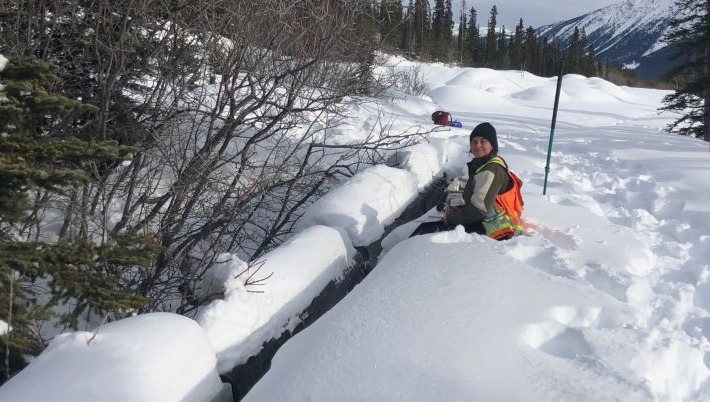When COVID-19 struck, Ensero Solutions was in the middle of a massive remediation project at the former Mount Nansen gold and silver mine in the Yukon. With budgets constrained and the company needing more capacity in the field, Chief People Officer Mitch Strom leapt at the chance to bring on two skilled young workers through the BioTalent Canada Science and Technology Internship Program – Green Jobs.
Ensero helps mining companies achieve their environmental responsibility goals by supporting environmental assessments and permitting, water treatment, and the remediation of former mine sites. The Mount Nansen project is one of the largest remediation projects in the Yukon — and a big undertaking for the Ensero team. Being able to add the people power of university graduates Talor Osberg and Sara Battaglia is key.
“We wouldn’t have hit a lot of our field goal requirements and commitments without Talor and Sara,” says Strom. “The STIP subsidy really helped during a tough year due to COVID.”
Hands-on field experience
Osberg and Battaglia were drawn to the bioeconomy by a mutual love of the great outdoors. Osberg grew up in the Okanagan Valley and did a degree in environmental integrated science and geographic information systems (GIS). Battaglia, from Ontario, earned her environmental engineering degree from the University of Guelph. They both say they were excited by the opportunity to do real, meaningful fieldwork and gain exposure to active mining sites.
“We get to go all over the Yukon — usually for a few days, sometimes up to a week,” says Osberg, whose placement as an environmental technician involved reclamation projects, hydrometry and water quality monitoring.
Battaglia worked primarily on groundwater programs and even helped manage some projects. An engineer-in-training, she says Ensero’s supportive talent-development culture brought a whole other dimension to the work experience. “My very first conversation with my internship supervisor was about my learning goals. Since then I’ve had great mentorship and support for my professional development.”
Both say their field work experience improved their troubleshooting skills. “When you have to rebuild a pump out in the middle of nowhere, you gain a lot of confidence in your ability to figure things out,” Battaglia notes.
Learning to do things differently
Osberg and Battaglia are the first candidates Ensero has brought in through a BioTalent Canada wage subsidy program. Beyond supporting their base salaries, the ability to cover some of the additional costs related to Battaglia’s development as an engineer-in-training is especially helpful, Strom says.
While diversity was not an official recruitment goal, Ensero is committed to having a good balance of people from different cultural backgrounds and of male and female workers — so hiring two young women was welcome. The company today is roughly 46% female, well above the bioeconomy average of 36%.
Ensero also gained some fresh perspective on its recruitment practices by hiring Osberg and Battaglia during the pandemic.
“Sara was able to come into the office for an interview because she was already in the Yukon. We interviewed and hired Talor on video. Some of those techniques may stay in place after the pandemic: where we might have flown someone in before, we’ve learned we can save a lot of costs.”
Both Osberg and Battaglia have been hired on permanently since the end of their placements. In Strom’s words, “That was an easy decision.”
